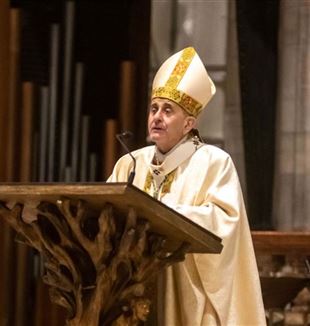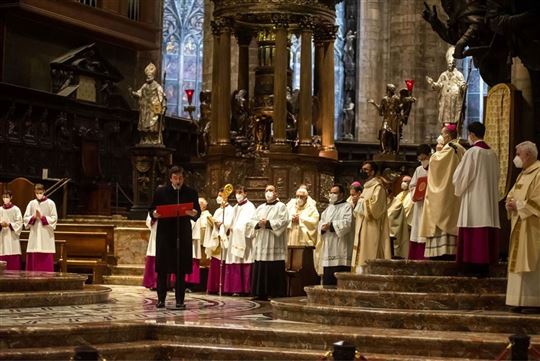
"For many, Fr. Giussani was the angel of God"
The homily of Monsignor Mario Delpini, Archbishop of Milan, during Mass for the centenary of the birth of the founder of CL. And greetings by Davide Prosperi and Fr. Julián Carrón.What do you have to say to the world, you disciples of Jesus?
What do you have to offer at this time in history, while anguish and confusion is spreading, causing a regression in humanity to violence, to Babel, the impossibility of coming to meet one another, of discussing and understanding one another?
What suggestion can you offer to this Europe of ours which is so wise, so full of good intentions, yet so powerless?
What do you have to propose, as the dream of peace is being shattered once again right here where the will of the people is for reasonableness, an ancient wisdom, political correctness and a union of peoples planning for a future of brotherhood?
What do you, disciples of Jesus, think of during this time when our thoughts turn obsessively to the price of gas, the interruptions of business relations, and the enormous harms done to our economics of prosperity?
Do you know how to do something beyond making declarations, of finding refined terminology to describe the feelings of indignation, harmless disapproval and analyses proper to “the next day?”
We carry an announcement.
We disciples of Jesus are, like everyone, living through these times of loss and confusion, of bewilderment and frustration, of concern for our society and our economic system.
But we are gathered here to listen to God’s word, and to remember a man, a priest: Fr. Giussani. God’s word invites us to meditate on the event of the Annunciation, and the person of Fr. Giussani can be offered as a commentary for and testimony of this event. 
We have nothing else to say except the Gospel, the Gospel of the Annunciation.
God’s work is completed in the form of a decisive event in history that history does not tell, it cannot record or describe it. God’s work in the house of that young woman from Nazareth came to a world of tribulation and injustice: the world did not know it, it did not recognize it, but God sent the angel Gabriel to write a new history. And that new history was called “the vocation of Mary,” of the virgin betrothed to a man from the house of David named Joseph.
So, to bring His promise to fulfillment, our God does not intervene in a noisy way. His way of casting down the mighty from their thrones and lifting up the lowly is not a revolution, but rather through the vocation of the handmaid of the Lord, that it may happen according to His word.
Mary’s vocation is announced with a greeting that causes deep turmoil. It is disconcerting because it announces the fullness of joy and of grace: rejoice, you who are full of grace! The form of the Annunciation, which calls Mary to participate in God’s work, remains consistent with God’s methods during every moment in the life of humanity. Every priest can tell the story of his vocation, sometimes somewhat mythologized by retelling over the years. The essential point is that each person has, at some time, received a word that has troubled him, awakened him, made him think, and inspired him to ask. No one can teach God the right time to send his angel for the “annunciation:” perhaps at age ten, perhaps in adolescence, perhaps at a time when a person seems to have already arrived, already been consecrated, already fixed on the tracks of a predictable history. But there is a moment when the word of an announcement breaks into that history and sows the seed of God’s glory. That young woman of Nazareth is the one full of grace, but the angel visits every house to which God sends him. He knocks at the doors of a particularly gifted, devout, and strong humanity, and at the doors of a mediocre humanity, people of modest capacity, marked by fragility and sin. So, too, are we priests, and the fruits of ministry are unpredictable.
We have received an announcement.
For many people, Fr. Giussani was the angel of God, an impetuous angel, capable of tenderness but rough at the same time, perhaps not irreproachable in his features and his language, in his relationships and choices, but still an angel who brought his announcement to many, and convinced many to be passionate about the fact of Christ.
This is how God also acts in our history, as well: with a vocation which brings His word to fulfilment.
Leaving everything behind, we run swiftly toward missionary horizons.
Vocation is never a private matter; you cannot reduce it to indicating to a person’s freedom a road on which he or she can walk. It is always a convocation. It inserts you amongst a people, calling you to participate in the Kingdom that is coming. The disciples are called together to be a sign of this new people.
Around Fr. Giussani, a movement took shape: the numbers multiplied, the works and words generated more works and words. But the Movement will only be able to speak a word to today’s world if, in the ecclesial communion, it is able to help to preserve the transparency of God’s work:
Love one another with fraternal affection; anticipate one another in showing honor… Rejoice in hope, endure in affliction, persevere in prayer… bless others and do not curse them (cf. Rm 12:9-16).
Dwelling within every human affair, we see a generous impulse, but also a meanness, the compactness of seasons of enthusiasm and of tensions and misunderstandings, the struggles of the seasons of tribulation, rivalries and stubbornness, differing points of view and feelings of gratitude and joy.
Every human history is both glorious and stunted.
Now, however, the time has come when mission imposes an urgency that cannot linger on internal issues, that does not let itself be held back by the shackles of misunderstandings and resentment. What is needed is passion and service, spiritual freedom and magnanimity: Have the same regard for one another; do not harbor desires of grandeur, but associate with the lowly.#100Initiatives